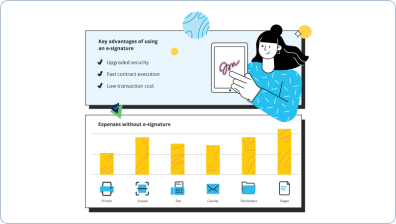How Do Electronic Signatures Work in India
- Quick to start
- Easy-to-use
- 24/7 support
Simplified document journeys for small teams and individuals




We spread the word about digital transformation
Why choose airSlate SignNow
-
Free 7-day trial. Choose the plan you need and try it risk-free.
-
Honest pricing for full-featured plans. airSlate SignNow offers subscription plans with no overages or hidden fees at renewal.
-
Enterprise-grade security. airSlate SignNow helps you comply with global security standards.







Your complete how-to guide - how do electronic signatures work in india
How do electronic signatures work in India? We have an answer!
Nowadays, printing hard copies of documents and manual signing is nothing but wasting time and paper. People around the world are going digital every single day and replacing wet signatures with eSignatures.
“how do electronic signatures work in India” is a big question right now. The answer is simple; utilize airSlate SignNow, a web-based service for fast, legally-binding electronic signatures.
How do I electronically sign PDFs and how do electronic signatures work in India?
- Create your account. Visit signnow.com, select Free trial to start the registration procedure.
- Select a doc. Click the Upload Documents button and find a PDF from the device or drag and drop one into the specified area.
- Change the file. Add new text, checkmarks, dates and so on, from the left sidebar.
- Make your sample interactive. Add fillable fields, dropdown lists, radio button groups, and more.
- Include a payment request. Click Settings > Request Payment.
- Check the your doc. Make sure all the details are up-to-date and accurate.
- Add signature fields. Include a Signature Field for each recipient you require.
- airSlate SignNow the PDF. Click the My Signature tool and choose to draw, type, or capture image of your autograph.
- Send the sample for signing. Select Invite to Sign and insert recipient email(s) to send and eSignature request.
- Download your copy. Select Save and Close > Download (on the right sidebar) to save the PDF on your device. /ol>
airSlate SignNow is helping active users all across India answer questions like “how do electronic signatures work in India?” Start your Free trial right now and enhance your document workflows!
How it works
Rate your experience
Understanding electronic signatures in India
Electronic signatures in India function as a digital equivalent of handwritten signatures, enabling individuals and businesses to sign documents electronically. Governed by the Information Technology Act of 2000, these signatures are legally recognized and can be used for various transactions, including contracts, agreements, and official documents. The act defines electronic signatures as a secure method of signing that ensures the authenticity and integrity of the document.
How to use electronic signatures in India
To use electronic signatures in India, individuals typically follow a straightforward process. First, the document that requires a signature is prepared and uploaded to an electronic signature platform. Users can then fill out any necessary fields within the document. Once ready, the document is sent for signature to the intended recipient. The recipient receives a notification, reviews the document, and applies their electronic signature using a secure method, such as a digital certificate or a biometric authentication method. After signing, both parties receive a copy of the completed document, ensuring a clear record of the transaction.
Steps to complete electronic signatures in India
Completing an electronic signature involves several key steps:
- Prepare the document: Create or upload the document that needs to be signed.
- Fill out the document: Enter any required information or data into the document fields.
- Send for signature: Use the electronic signature platform to send the document to the intended signer.
- Sign the document: The signer reviews the document and applies their electronic signature securely.
- Receive confirmation: Both parties receive a completed copy of the signed document for their records.
Legal use of electronic signatures in India
In India, electronic signatures are legally binding and recognized under the Information Technology Act. This act outlines the conditions under which electronic signatures are valid, including the requirement for a secure method of signature creation. It is essential for users to ensure that the electronic signature process complies with the legal framework to avoid disputes. Electronic signatures can be used for various legal documents, including contracts, agreements, and notices, provided they meet the necessary security standards.
Security and compliance guidelines for electronic signatures
When using electronic signatures, it is crucial to adhere to security and compliance guidelines to protect sensitive information. Users should choose a reputable electronic signature platform that offers encryption, secure storage, and authentication methods. Additionally, it is important to maintain an audit trail that records each step of the signing process, ensuring transparency and accountability. Compliance with relevant laws and regulations, including data protection laws, is also essential to safeguard user information and maintain the integrity of signed documents.
Documents commonly signed electronically
Various types of documents can be signed electronically in India, including:
- Contracts and agreements
- Employment documents
- Financial agreements
- Legal notices
- Government forms and applications
These documents benefit from the efficiency and speed of electronic signatures, allowing for quicker processing and reduced paperwork.
Sending and signing methods for electronic signatures
Users can send and sign documents electronically using various methods. Most electronic signature platforms, including airSlate SignNow, offer web-based solutions, allowing users to access documents from any device with internet connectivity. Mobile applications also provide the flexibility to sign documents on the go. Users can upload documents, fill them out, and send them for signature through their preferred method, ensuring a seamless signing experience.
-
Best ROI. Our customers achieve an average 7x ROI within the first six months.
-
Scales with your use cases. From SMBs to mid-market, airSlate SignNow delivers results for businesses of all sizes.
-
Intuitive UI and API. Sign and send documents from your apps in minutes.
FAQs
-
How do electronic signatures work in India?
In India, electronic signatures are legally recognized under the Information Technology Act, 2000. They work by allowing individuals to sign documents digitally, ensuring authenticity and integrity. This process involves using a secure digital certificate that verifies the signer's identity, making it a reliable method for signing contracts and agreements.
-
What are the benefits of using electronic signatures in India?
Using electronic signatures in India streamlines the signing process, saving time and reducing paperwork. They enhance security through encryption and authentication, ensuring that documents are tamper-proof. Additionally, electronic signatures are cost-effective, eliminating the need for physical storage and printing.
-
Are electronic signatures legally binding in India?
Yes, electronic signatures are legally binding in India as per the Information Technology Act, 2000. They hold the same legal weight as traditional handwritten signatures, provided they meet certain criteria for authenticity. This makes them a valid option for executing contracts and agreements.
-
How do I integrate electronic signatures into my business processes in India?
Integrating electronic signatures into your business processes in India is straightforward with platforms like airSlate SignNow. You can easily upload documents, add signature fields, and send them for signing. The platform also offers APIs for seamless integration with existing systems, enhancing workflow efficiency.
-
What features should I look for in an electronic signature solution in India?
When choosing an electronic signature solution in India, look for features such as user-friendly interfaces, robust security measures, and compliance with local regulations. Additionally, consider options for document tracking, templates, and integration capabilities with other software to enhance your workflow.
-
How does pricing for electronic signature solutions work in India?
Pricing for electronic signature solutions in India varies based on features and usage. Many providers, including airSlate SignNow, offer flexible pricing plans that cater to different business sizes and needs. It's essential to evaluate the features included in each plan to find the best value for your organization.
-
Can electronic signatures be used for international documents in India?
Yes, electronic signatures can be used for international documents in India, provided they comply with the legal requirements of the respective countries. airSlate SignNow ensures that your electronic signatures meet international standards, making it easier to conduct business globally.
How do electronic signatures work in india
Trusted eSignature solution - how do electronic signatures work in india
Related searches to how do electronic signatures work in india
Join over 28 million airSlate SignNow users
Get more for how do electronic signatures work in india
- Unlock the Power of Electronic Signature Legitimateness ...
- Enhance Electronic Signature Legitimateness for Support ...
- Electronic Signature Legitimateness for Support in ...
- Boosting Electronic Signature Legitimateness for ...
- Enhance Electronic Signature Legitimateness for Support ...
- Unlock Electronic Signature Legitimateness for Support ...
- Unlock Electronic Signature Legitimateness for ...
- Electronic Signature Legitimateness for Accounting in ...
The ins and outs of eSignature




















































